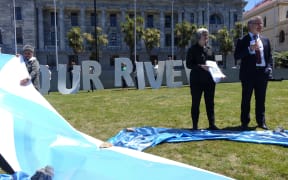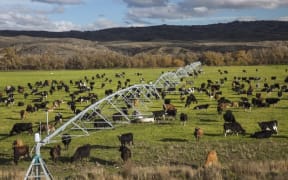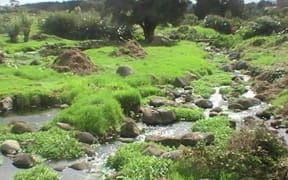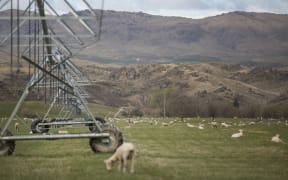One of the government's top scientists is being blasted for talking up the environmental benefits of irrigation.

Jacqueline Rowarth Photo: Billy Wong/University of Auckland
Jacqueline Rowarth, the chief scientist at the Environmental Protection Authority, said irrigation ensures farmers can make a buck, which in turn can be spent on environmental responses like controlling rabbits.
At a recent visit to an irrigation scheme in Central Otago, Dr Rowarth said irrigation helps keep farmers profitable, allowing them to fund environmental projects.
The Otago Daily Times quoted Dr Rowarth as having said that irrigation, when done right, can be a "great boon" to the environment.
Speaking from Adelaide, Dr Rowarth explained her view.
"I was saying the irrigation there was building up organic matter, which allows contracts to be met, which then allows income flow, which also allows environmental protection," she said.
But Massey University's fresh water ecologist Mike Joy said those comments were bizarre.
"I can assure her as a fresh water ecologist and a fresh water scientist who's been working in this area for a couple of decades now that irrigation is not good for the environment. It is very bad for the environment - the fresh water environment especially.
"It allows for intensification, in fact it drives intensification because collecting water like that is expensive, somebody has to pay for it, so you have to intensify to pay for it and then there are lots of ongoing negative effects for that."
But Dr Joy said he was not surprised.
"It fits in with what she's been saying for a long-time, she works in the agribusiness area and she has these views that intensification is good, I think she's kind of out on her own in many ways."
Greenpeace agricultural campaigner Gen Toop said Dr Rowarth could not be more wrong.
"There are no environmental benefits to irrigation in New Zealand.
"Irrigation drives the intensification of agriculture, particularly dairying and we all know the more cows there are the more pollution ends up in our waterways."
But Irrigation New Zealand chief executive Andrew Curtis said Dr Rowarth was on the money.
"Well there was no real surprises to us, we have known for quite a long while that irrigation does actually have lots of benefits - particularly from a cropping perspective," he said.
He said recent research has also shown that irrigated crops can have a better environmental footprint than non-irrigated crops - because you get a guaranteed yield and so can better judge nutrients.
But Mr Curtis acknowledged irrigation has done damage.
"Definitely (we) put our hand up, we have had some impacts in the past - but look we are very much trying to address them currently."
The Labour-led Government is stopping subsidies for big irrigation schemes around the country. Conservation Minister Eugenie Sage said that was because of the enormous environmental damage.
"We've seen in Canterbury alone over about 12 years - 12,000 hectares of land adjacent to riverbeds converted to pasture.
"That's meant the loss of significant riparian habitats, wetlands, dairy cows being grazed on areas where the nutrients go straight through the stoney soils and into aquifers."
Ms Sage said they were also reducing the water flows needed to sustain native birdlife and fish.






